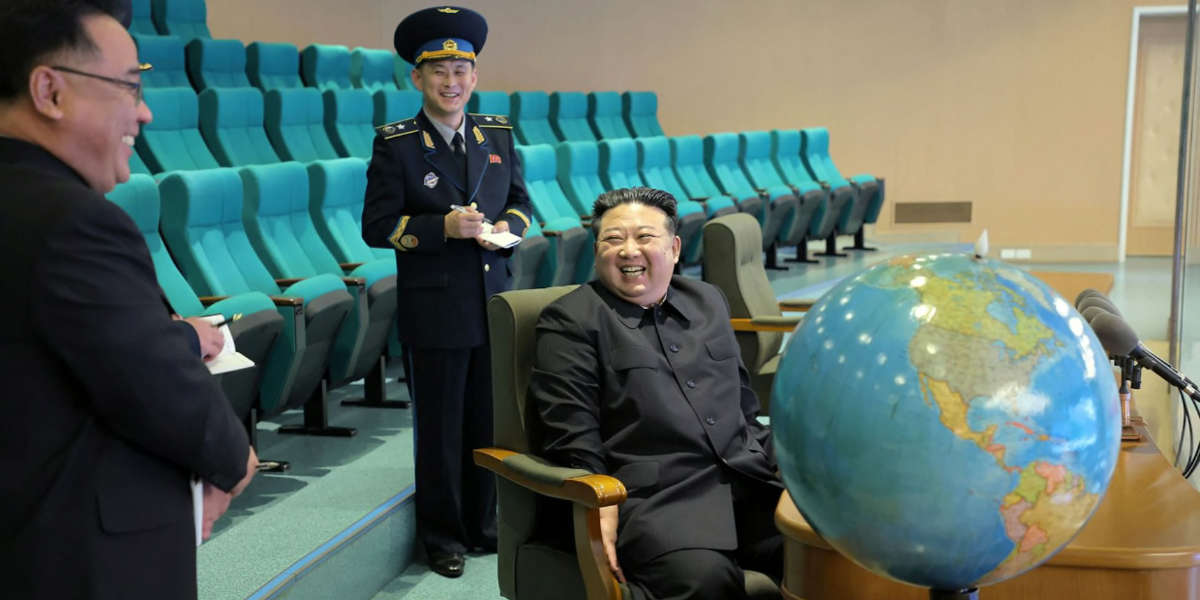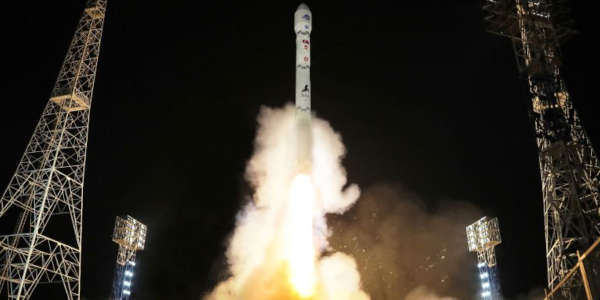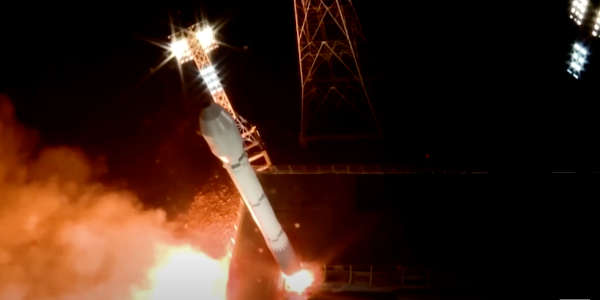In the picture
Kim Jong Un visits the Pyongyang General Control Center at the State Directorate of Aerospace Technology in Pyongyang, in November 2023 [KCNA].
Escalating tensions throughout the Korean Peninsula mark the beginning of the 2024 new year as North Korea and South Korea adopt a policy of deterrence as a result of massive military buildup throughout the previous year. In a New Year's Eve address Supreme Leader Kim Yong Un stated that inter-Korean relations have become a "relationship between two hostile countries and two belligerents at war" ultimately rescinding North Korea's long-standing policy of reunification. He blamed the increasing military buildup of South Korea and, particularly, the United States, as he emphasized that "because of reckless moves by the enemies to invade us... war can break out at any moment."
As a response, South Korean President Yoon Suk Yeol stated in his New Year's Day address that Seoul would strengthen its own military's preemptive capabilities, missile defense systems and retaliatory measures to prevent possible aggression and hostility from its neighbor to the north.
Kim officially declared the Democratic People's Republic of Korea (DPRK) as an "irreversible" nuclear power in 2022 after passing a series of legislative acts that allowed the country to: 1) effectively build up its nuclear arsenal by conducting an unprecedented amount of nuclear weapons tests and; 2) carry out automatic preventive nuclear strikes against any perceived hostile forces. Since then, North Korea has put into orbit a spy satellite, in its third attempt, and has pledged to launch three more in the upcoming year.
In response to the launch, Seoul has temporarily and partially suspended the 2018 Comprehensive Military Agreement with Pyongyang that was specifically designed to prevent rampant military buildup and accidental skirmishes between both countries. The National Security Council stated that the suspension would trigger the restoration of a series of measures along the 38th parallel to prevent further aggression and maintain some semblance of regional stability.
South Korea's attempt to prevent future confrontations at the border through deterrence utterly failed as the Korean Central News Agency released a statement in which Kim's government announced its complete and immediate withdrawal from the Comprehensive Military Agreement. In the statement, released by the North Korean Defense Ministry, Pyongyang stated that it would "immediately restore all military measures that have been halted." This course of action comes at a time where Pyongyang deems it "indispensable" to maintain a well-developed spy satellite program to counter US "space militarization."
The suspension of the 2018 Comprehensive Military Agreement as well as statements from Pyongyang and Seoul fueled by their increasing ambitions could eventually culminate in the full militarization of the Korean Peninsula as a result of their rivalry and the pursuit of security through deterrence strategies.
The objective of this analysis is to evaluate a scenario in which the militarization of the Korean Peninsula could potentially open up a third front, alongside Ukraine and Gaza, that would destabilize the global balance of power and possibly trigger additional armed conflicts as the established powers fail to effectively act on all fronts.
The established fronts
Since Russia's invasion of Ukraine in 2022, the US has sent over $75 billion in humanitarian, financial and military aid to the European country. Many analysts argue that the amount of foreign aid provided by the US has played a "pivotal role in Ukraine's defense and counteroffensive against Russia."
US involvement in Ukraine goes beyond providing defensive mechanisms to the previously defenseless country. The illegal and brutal war of aggression waged by Russia against a sovereign state highly endangers the NATO countries that border Ukraine. If Russia emerges as the victorious power and effectively annexes Ukraine into its territory, this scenario would encourage Russian President Vladimir Putin to pursue his other ambitions and risk another war on the European continent; a war characterized by nuclear weapons.
Similarly enough, Israel has been able to build and develop one of the world's most formidable militaries solely based on foreign aid provided by the US. Since 1951 the US has provided over $225.5 billion in military aid and over $92.7 billion in economic aid to Israel making them the top recipient of US foreign aid since World War 2.
As in the case of Ukraine, US foreign aid towards Israel is part of a broader regional strategy. According to a report by the Congressional Research Service, the US strategy in the Middle East is to provide Israel a "qualitative military edge" over the other countries in the region. This is because the US sees stability in an ally like Israel that serves to counter the hostility of other countries such as Afghanistan, Iran and Syria.
By the end of October, President Biden presented to Congress a request for military aid of $105 billion, most of which would be allocated towards Ukraine and Israel. He urged congress to vote in favor of his request as the overall package would ensure "American Security for generations."
The amount of military and economic aid deployed by Washington to both Israel and Ukraine only proves that both countries serve as pivotal fronts of the global order the US is battling for maintaining. Ensuring stability and a subsequent victory in both regions is crucial for maintaining global stability and the current balance of power.
A defeat in either of these fronts would symbolize a major defeat for US interests globally and could potentially trigger further conflicts as the US fails to effectively defend its interests. A defeat in Ukraine would grant Russia leeway to pursue other territorial interests in Eastern Europe right at the border of the European Union and various NATO countries. Additionally, a full annexation of Ukraine would give Vladimir Putin the boost he needs to pursue further interests abroad at the expense of western powers. Similarly, In Israel, the US seeks to maintain a stable ally in the region to counter the increasing influence of Iran as well as the increasing presence of notorious terrorist organizations such as Hamas, the Houthis, and Hezbollah.
The emerging front
Since 2019, Pyongyang has rapidly attempted to ramp up its military capabilities which include: expanding their military personnel, improving their technological weapons systems and expanding their nuclear and missile arsenals. This is evidenced by the fact that in 2023 North Korea tested over 100 ICBMs and has vowed to test-launch even more in the first months of 2024 as well as launch three more spy satellites in addition to the one successful satellite launch in late 2023. These developments come at a time in which Pyongyang is becoming increasingly closer to Beijing and Moscow, and Seoul besides preserving its relationship with Washington is increasing its proximity to Tokyo.
In fact, South Korea officials have raised concerns that Russian assistance heavily contributed to the successful spy satellite launch as the launch occurred right after Kim Jong Un visited Moscow for a Vladimir Putin Summit in which the Russian President promised to aid North Korea's satellite development program.
As a response to the increased hostility on behalf of Pyongyang, Seoul and Washington have adopted a strategy of deterrence which is focused on increased joint military exercises and the deployment of US military assets throughout the region in order to prevent a possible armed conflict and maintain the status quo. Besides, in South Korea some discussion about nuclearization has started, hinting at a path of nuclear proliferation that the US dislikes.
Given Kim's remarks during his New Year's Eve address in which he renounced his long-standing policy of reunification and essentially defined inter-Korean relations as "two belligerents at war," as well as the fact that technically both countries remain in a state of war, it is reasonable to conclude that an armed conflict or even a full blown war on the peninsula could be not a matter of if but of when.
In their attempt to maintain the balance of power in the Korean Peninsula, both sides have inadvertently created an alliance system that notoriously resembles those that were present at the eve of the First World War. The US, Japan and South Korea resemble the established powers who are eager to maintain regional stability and tip the balance of power in their favor to sustain the status quo. Russia, China and North Korea to a certain extent resemble the emerging powers who seek to dismantle the current balance of power in order to pursue their interests who are in direct conflict with those of the established powers.
As Seoul and Pyongyang continue to develop their military capabilities in preparation for war, a small act of provocation could trigger a full-scale conflict between both sides. In this scenario the Korean Peninsula would become the third front of global stability next to Ukraine and Israel in which the established powers (particularly the US) would deem it necessary to intervene to maintain the global balance of power.



